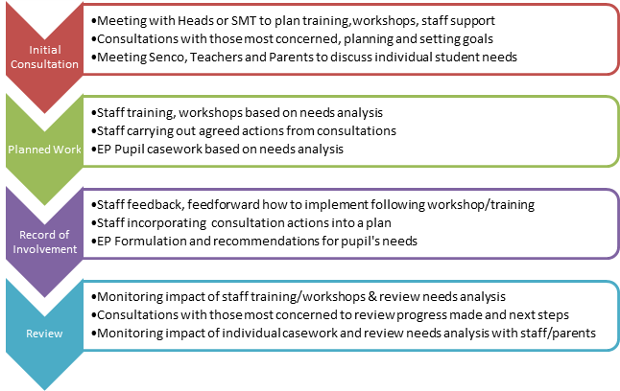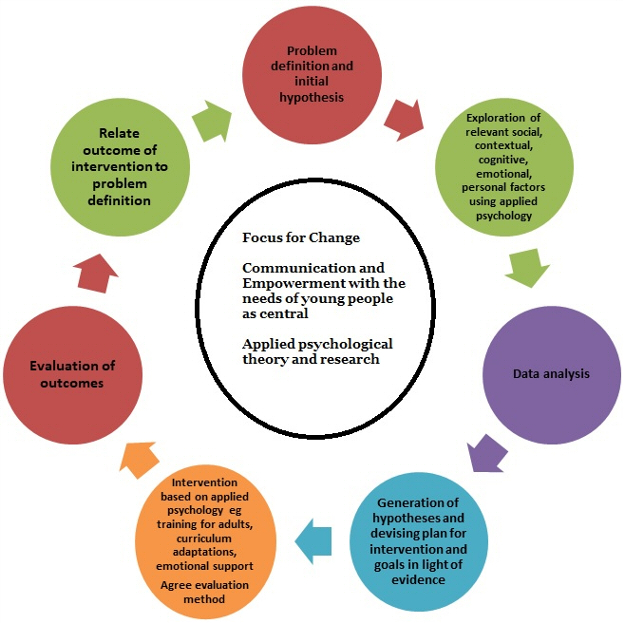Schools
Information for Schools
What can I offer to schools?
EPs are trained to apply knowledge of psychology and child development to help understand what might be happening in a situation and explore ways to move things forward for the child or young person. EPs support with learning, communication, behavior and emotional and social development.
What might this include?
School based support
I work in partnership with schools to offer a bespoke package of support based upon the needs of an individual school or group of schools. For example:
• Psychological supervision for senior leaders, teachers and support workers, especially those working with children with complex learning, social and emotional needs.
• Structured peer support sessions for staff though group based consultation and ‘Solution Circles” which are an effective way to problem solve work-related concerns.
• Running half day teacher ‘drop-in’ consultations in school, to problem-solve and plan for work-related issues and pupils causing concern.
• Working with school staff to support children with complex needs such as children with autism and other developmental difficulties and those with mental health needs
• Delivering training on interventions to support SEN (e.g. Precision Teaching, Self-Regulated Strategy Development, Reciprocal Teaching, Paired Reading, Cued Spelling, Social Skills, Social Stories/Communicating Cartoons, Choice Points, Social Mapping, Emotional Literacy etc)
• Delivering training on approaches and strategies (e.g. CBT approaches, Choice Theory, Choice Points, Social Mapping, Functional Behaviour Analysis, Anxiety, Memory, Executive Functioning, Self-Regulated Learning etc)
• Working strategically with the SENCO/Inclusion Manager, for example:
o To map provision and develop comprehensive and evidence-based support for pupils with additional needs e.g. deployment of TA’s, promoting (and training) ‘champions’ for areas of SEND
o To monitor progress/impact of interventions
o To identify good practice and work with staff within and across schools
o To facilitate parent groups to discuss SEND related issues and share experiences in a containing and mutually supportive environment
Individual assessment
An independent Educational Psychology assessment can be helpful when staff and parents are concerned about a pupil’s progress and development and would like support in understanding this further and identifying ways to achieve positive outcomes. I apply a strengths based approach which aims to make the assessment a positive experience for all involved. For example:
• I may attend a meeting with members of school staff, family and any other professionals involved to discuss a pupil’s needs and plan ways forward.
• I may meet the pupil to gather their views and carry out some assessments. Each assessment is tailored to the needs of the individual. For younger children, a play-based approach can be used to understand how a child learns, communicates and feels. For older children, questionnaires and standardised assessment tools may be used, alongside observation and informal conversation.
Assessments are followed up with a written report detailing the outcomes of the assessment and support strategies so that parents and schools know the appropriate next steps in supporting the child or young person. School staff will put the agreed actions and recommendations in place and keep parents updated of progress.
Please see below models of school based support and individual assessment
Model of working at Multi Academy Trust Level


Claire Minds Model for Psychological Assessment and Intervention
This is drawn from Professional Practice Guidelines, DECP 2002


By submitting your information, you are happy for Claire Minds psychology to contact you.
